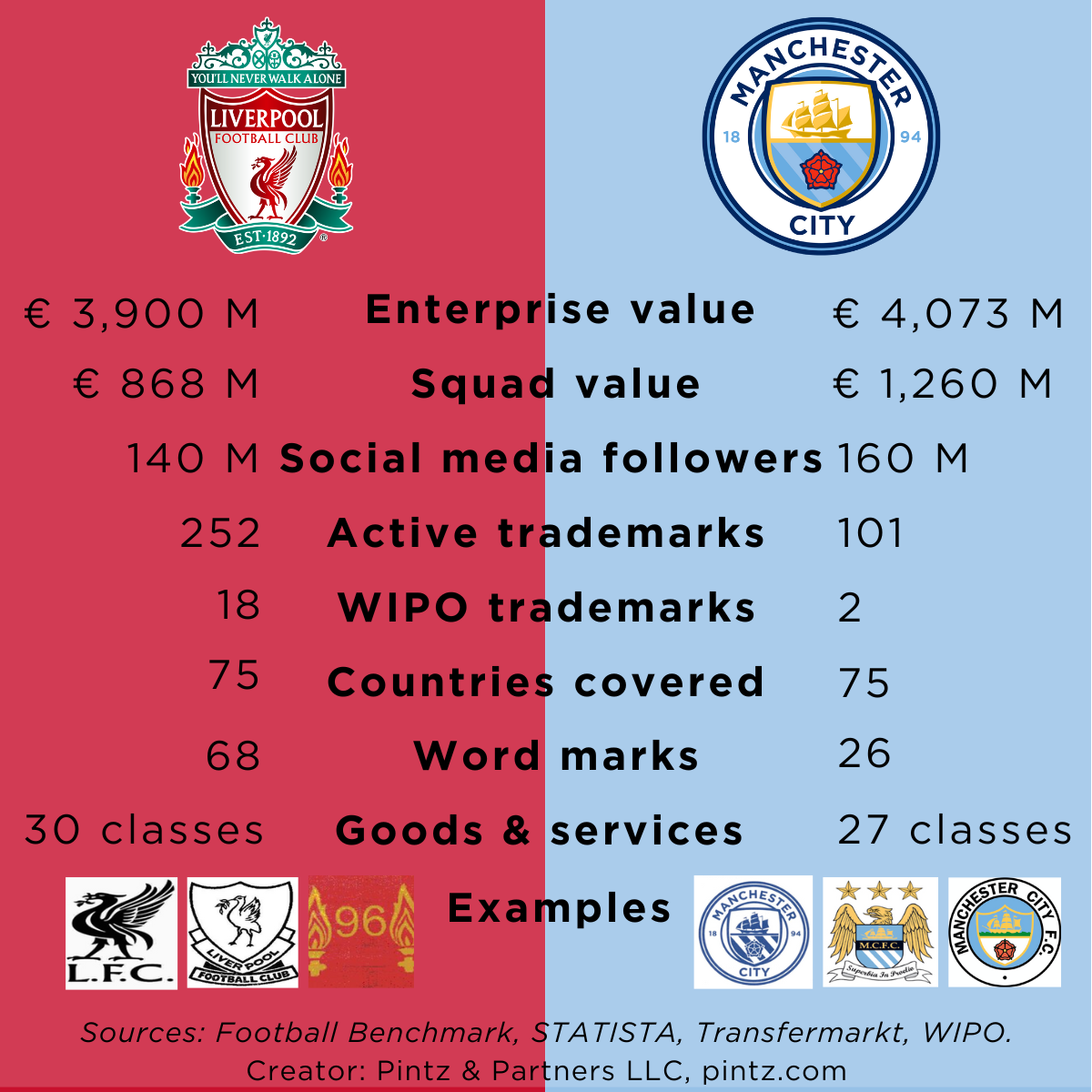Trademark Clash: Liverpool vs. Manchester City - Exploring Football's Iconic Rivalry from Brand Perspectives
In the pulsating world of football, where the roar of the crowd meets the finesse of the game, rivalries extend beyond the pitch into realms of business and branding. In this article, we delve into the trademark perspectives of two football giants: Liverpool and Manchester City.
Enterprise Value:
With staggering enterprise values of €3,900 million for Liverpool and €4,073 million for Manchester City, these clubs stand as behemoths in the footballing landscape, not only for their on-field prowess but also for their off-field business acumen.
Squad Value:
Liverpool boasts a squad valued at €868 million, while Manchester City's squad eclipses it with an impressive €1,260 million valuation. These figures reflect the substantial investments made by both clubs to assemble world-class teams. Both teams boast an array of exceptional talent within their ranks. For Liverpool, standout players include the prolific Mohamed Salah, the dynamic Dominik Szoboszlai, the ever-reliable Trent Alexander-Arnold, and their commanding captain, Virgil van Dijk. Manchester City, on the other hand, is home to one of the world's most valuable players, Erling Haaland. Additionally, talents like Phil Foden, Rodri, and Kevin De Bruyne significantly enhance the club's value with their exceptional skills and contributions on the field.
Social Media Followers:
In the digital arena, Liverpool commands a legion of 140 million social media followers altogether, while Manchester City leads with an impressive 160 million. These vast followings amplify the clubs' reach and influence across the globe, shaping the modern footballing zeitgeist.
Trademark Portfolio:
Liverpool leads the charge with 252 active trademarks, while Manchester City isn't far behind with 101. These trademarks serve as digital flags, rallying fans across the globe under their respective banners. Liverpool's trademark arsenal boasts 68 word marks, a testament to the club's rich history and iconic status in the footballing world. In comparison, Manchester City trails with 26 word marks, highlighting the differing approaches to brand protection and representation.
Global Reach:
Both Liverpool and Manchester City have stamped their authority across 75 countries, spreading their influence far and wide. This global footprint not only fuels fan engagement but also opens doors for commercial opportunities and partnerships, solidifying their positions as global brands. Moreover, Liverpool capitalizes on the Madrid System more effectively, leveraging WIPO trademarks to expand its global footprint.
Goods and Services Covered:
In the realm of goods and services covered by trademarks, Liverpool edges ahead with 30 classes compared to Manchester City's 27. This comprehensive coverage reflects Liverpool's intent to safeguard its brand across various sectors and industries, ensuring its legacy endures beyond the confines of the football pitch. Notably, Liverpool's protected goods and services span a wide array, encompassing cosmetic products, lamps, jewellery, mirrors, and matches, revealing the club's proactive stance in defending its brand identity across various consumer markets.
Notably, Liverpool FC recently released a statement acknowledging that they had unsuccessfully applied to trademark the word 'Liverpool'. The club clarified that their application, submitted to the Intellectual Property Office in the UK, aimed to protect various assets including the iconic Liver Bird logo and associated elements.
At the beginning of this year, Manchester City encountered a recent trademark infringement issue involving Superdry. The clothing company initiated a trademark infringement action against Manchester City, specifically targeting the use of the term 'Super "DRY"' on its training kit, as part of its Asahi sponsorship deal. The dispute highlights the complexities and legal intricacies surrounding trademark issues in the sports industry. Both parties are engaged in legal proceedings to resolve the matter.
In conclusion, the rivalry between Liverpool and Manchester City extends far beyond the green turf, permeating into the realms of business, branding, and global influence. As these footballing titans continue to vie for supremacy on and off the field, their trademark perspectives offer a fascinating insight into the multifaceted nature of modern football clubs.

